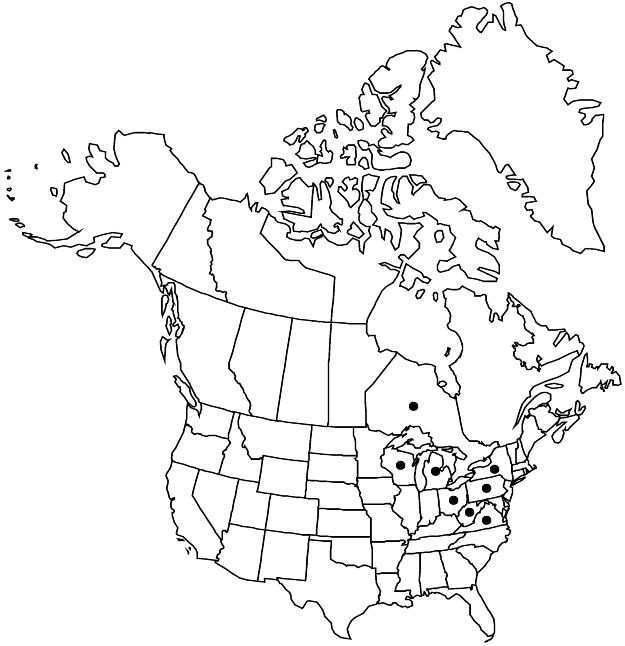Difference between revisions of "Crataegus populnea"
Ann. Carnegie Mus. 1: 395. 1902.
FNA>Volume Importer |
imported>Volume Importer |
||
| (6 intermediate revisions by 2 users not shown) | |||
| Line 16: | Line 16: | ||
|name=Crataegus compta | |name=Crataegus compta | ||
|authority=Sargent | |authority=Sargent | ||
| − | }}{{Treatment/ID/Synonym | + | |rank=species |
| + | }} {{Treatment/ID/Synonym | ||
|name=C. iracunda var. populnea | |name=C. iracunda var. populnea | ||
|authority=(Ashe) Kruschke | |authority=(Ashe) Kruschke | ||
| − | }}{{Treatment/ID/Synonym | + | |rank=variety |
| + | }} {{Treatment/ID/Synonym | ||
|name=C. luxuriosa | |name=C. luxuriosa | ||
|authority=Sargent | |authority=Sargent | ||
| + | |rank=species | ||
}} | }} | ||
|hierarchy=Rosaceae;Rosaceae subfam. Amygdaloideae;Rosaceae tribe Gillenieae;Crataegus;Crataegus sect. Coccineae;Crataegus (sect. Coccineae) ser. Populneae;Crataegus populnea | |hierarchy=Rosaceae;Rosaceae subfam. Amygdaloideae;Rosaceae tribe Gillenieae;Crataegus;Crataegus sect. Coccineae;Crataegus (sect. Coccineae) ser. Populneae;Crataegus populnea | ||
| Line 37: | Line 40: | ||
|elevation=10–400 m | |elevation=10–400 m | ||
|distribution=Ont.;Mich.;N.Y.;Ohio;Pa.;Va.;W.Va.;Wis. | |distribution=Ont.;Mich.;N.Y.;Ohio;Pa.;Va.;W.Va.;Wis. | ||
| − | |discussion=<p>Crataegus populnea occurs from Wisconsin to New York, to Ohio, and Virginia; it is common at least from southern Ontario to Pennsylvania. Dubious specimens from Georgia and South Carolina have small leaves and are only differentiated from C. iracunda (ser. Tenuifoliae) by their more coriaceous nature. Being out of range for C. populnea, they may represent an odd form of C. iracunda.</p><!-- | + | |discussion=<p><i>Crataegus populnea</i> occurs from Wisconsin to New York, to Ohio, and Virginia; it is common at least from southern Ontario to Pennsylvania. Dubious specimens from Georgia and South Carolina have small leaves and are only differentiated from <i>C. iracunda</i> (ser. Tenuifoliae) by their more coriaceous nature. Being out of range for <i>C. populnea</i>, they may represent an odd form of <i>C. iracunda</i>.</p><!-- |
| − | --><p>Crataegus compta is a variant with more or less pyriform-oblong pomes. Crataegus populnea might be mistaken for C. macrosperma but it has more coriaceous leaves, usually significantly larger in the area of sympatry, and a harder fruit.</p> | + | --><p><i>Crataegus</i> compta is a variant with more or less pyriform-oblong pomes. <i>Crataegus populnea</i> might be mistaken for <i>C. macrosperma</i> but it has more coriaceous leaves, usually significantly larger in the area of sympatry, and a harder fruit.</p> |
|tables= | |tables= | ||
|references= | |references= | ||
| Line 47: | Line 50: | ||
-->{{#Taxon: | -->{{#Taxon: | ||
name=Crataegus populnea | name=Crataegus populnea | ||
| − | |||
|authority=Ashe | |authority=Ashe | ||
|rank=species | |rank=species | ||
| Line 62: | Line 64: | ||
|publication year=1902 | |publication year=1902 | ||
|special status=Endemic | |special status=Endemic | ||
| − | |source xml=https:// | + | |source xml=https://bitbucket.org/aafc-mbb/fna-data-curation/src/2e0870ddd59836b60bcf96646a41e87ea5a5943a/coarse_grained_fna_xml/V9/V9_967.xml |
|subfamily=Rosaceae subfam. Amygdaloideae | |subfamily=Rosaceae subfam. Amygdaloideae | ||
|tribe=Rosaceae tribe Gillenieae | |tribe=Rosaceae tribe Gillenieae | ||
Latest revision as of 00:00, 6 November 2020
Shrubs or trees, 60 dm. Stems: twigs: new growth reddish green, glabrous, 1-year old reddish brown, sometimes dark, older mid gray; thorns on twigs recurved, 2-years old dark blackish red, ± shiny, ± slender, 3–5 cm. Leaves: petiole 2–4 cm, glabrous, eglandular or sparsely glandular; blade ± ovate, 4–7 cm length/width = to 1.5, subcoriaceous, base broadly rounded to broadly cuneate, rarely truncate, lobes 3–5 per side, sinuses usually shallow, lobe apex acute to acuminate, margins strongly serrate, veins 5 or 6 per side, apex acuminate, adaxial surface glabrate to appressed-hairy young, glabrescent; extension-shoot leaf blades widest 2/5 from base, length/width = 1.3–1.4, sinuses not deep, LII less than 25%, base broadly cuneate, rarely truncate. Inflorescences 5–12-flowered; branches glabrous; bracteoles few, very narrow, margins glandular. Flowers 16–18 mm diam.; hypanthium glabrous; sepals narrowly triangular, 5–6 mm, margins subentire, abaxially glabrous; stamens 6–10, anthers red to purple; styles 3 or 4. Pomes reddish orange to bright red, suborbicular to oblong, 8–11 mm diam.; flesh hard; sepals commonly erose, patent-reflexed; pyrenes 3 or 4, dorsally grooved. 2n = 68.
Phenology: Flowering Apr–May; fruiting Sep–Oct.
Habitat: Brush, fencerows
Elevation: 10–400 m
Distribution

Ont., Mich., N.Y., Ohio, Pa., Va., W.Va., Wis.
Discussion
Crataegus populnea occurs from Wisconsin to New York, to Ohio, and Virginia; it is common at least from southern Ontario to Pennsylvania. Dubious specimens from Georgia and South Carolina have small leaves and are only differentiated from C. iracunda (ser. Tenuifoliae) by their more coriaceous nature. Being out of range for C. populnea, they may represent an odd form of C. iracunda.
Crataegus compta is a variant with more or less pyriform-oblong pomes. Crataegus populnea might be mistaken for C. macrosperma but it has more coriaceous leaves, usually significantly larger in the area of sympatry, and a harder fruit.
Selected References
None.